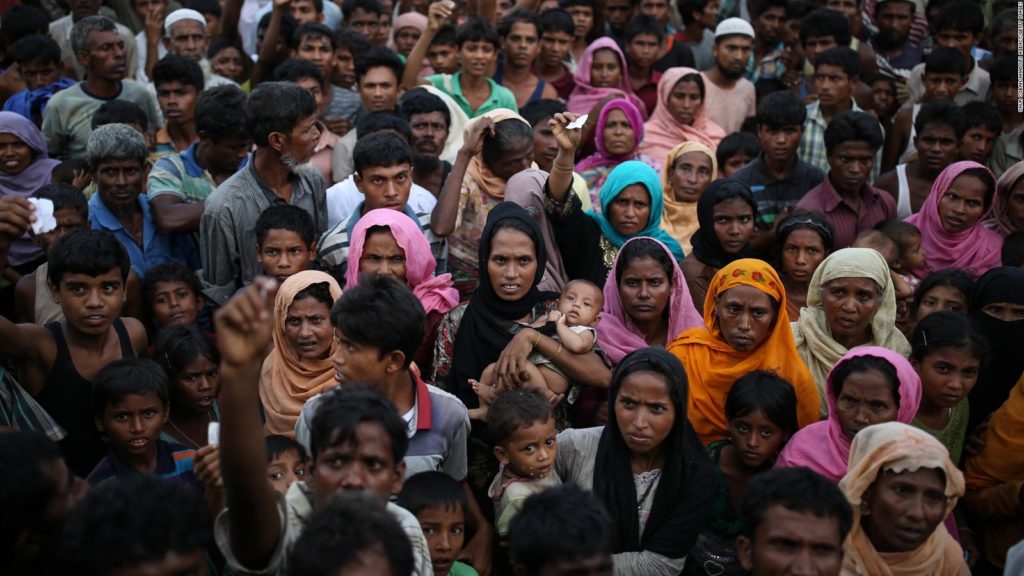Anna Synakh || Copy Editor

The Rohingya people are a Muslim minority group that formerly lived on the western coast of Myanmar (formerly Burma), a predominantly Buddhist country. This group has been persecuted for their religious beliefs ever since mid-nineteenth century. In 1977, they were denied citizenship and labeled as ‘illegal’ residents. Such laws started both military and civilian attacks on the group, forcing it into displacement. Nearly 200,000 Rohingya people escaped to Bangladesh, running away from mass arrests and violence and hoping for a better future. While the government of Bangladesh was willing to host refugee camps in theory, it simply lacked funds to provide for this new population. The refugees struggled to survive.
In 1989, the government of Burma changed, and the persecution worsened. The Rohingya who did not escape before faced unimaginable violence, enduring torture and rape on the daily basis. This time, nearly 250,000 Rohingya fled to Bangladesh. The options for a new home consisted at that time of twenty refugee camps around Bangladesh with a very low quality of life.
In 1992 this conflict was finally noticed by the United Nations. A treaty was created between Bangladesh and Myanmar, stating that Rohingya will be repatriated and provided appropriate documentation in their country of origin. Bangladeshi refugee camps closed down and no longer accepted new arrivals. A large portion of Rohingya returned to Myanmar but they were not provided with any documentation as promised. Bangladesh closed 18 out of 20 camps and the remaining two were in dire condition.
In 2015, a new party was elected into the majority in Burma. The leader of the party, Aung San Suu Kyi, was a Nobel Peace Prize winner, due to her democratic stance prior to the election. The world powers were hopeful about the future of the Rohingya under this newly elected government, in addition to renewed positivity about the state of Burma overall.
In 2016, a new outburst of violence broke out in the region due to clashes between the military and local militias. Rohingya were being attacked directly by the military. Aung San Suu Kyi and the head of the military still claim that these clashes were not geared towards the Muslim minority.
In the summer of 2017, persecution of the Rohingya minority worsened. Their villages were burned. Men were slaughtered on the spot. Women were raped en masse. Children were beaten. The 570,000 that manage to survive the horrors of the attacks once again escaped to Bangladesh. The government of Myanmar stated that the Rohingya people are nothing but Islamic terrorists and that the military was simply trying to prevent the spread of terrorism into other regions.
As of now, more than 600,000 Rohingya remain in Bangladesh. The UN High Commissioner for Refugees has started a program which provides refugees with identification cards, thus validating their existence, in the hopes that someday they might use this identification to cross the border and return home.
The violence against the Rohingya population has not stopped since the 1970s. Many of them have not yet known a life in peace. Many of them will never know one. The global NGOs have struggled to call the persecution of this Muslim minority a genocide for years, as no proper solutions have been found. The government of Myanmar has denied the presence of genocidal intentions.
Last week, the Republic of the Gambia filed a genocide case against Myanmar in the International Court of Justice (ICJ). The ICJ will hold public hearings from December 10th through December 12th. The Gambia is a part of the Organization of Islamic Cooperation, which in the past has spoken out against these genocidal actions. Gambian Attorney General Abubacarr Marie Tambadou provided The Associated Press with the following statement, claiming that the filing of the case should “send a clear message to Myanmar and to the rest of the international community that the world must not stand by and do nothing in the face of terrible atrocities that are occurring around us. It is a shame for our generation that we do nothing while genocide is unfolding right before our own eyes.”
Aung San Suu Kyi responded in a Facebook post which stated that she will be representing her country in court. The post never mentioned the issue of the Rohingya Genocide addressed by the Gambian government but rather referred to it as the issue of the “displaced persons in the Rakhine state.”
Earlier in the week, the ICC, the international court which investigates individuals, had requested to investigate certain representatives of the Myanmar government because of their apparent encouragement of the violence against the Rohingya. The request was denied by Myanmar, as the country is not a member of the ICC and thus does not have to fulfill such demands.
For nearly fifty years the world has ignored the persecution of the Rohingya people, but it seems that nations worldwide are finally noticing the awfulness of the actions taking place. Although the outcomes of the ICJ investigation cannot be foreseen, there is hope that the Rohingya will finally find justice, and possibly even peace.
Sophomore Anna Synakh is a copy editor. Her email is asynakh@fandm.edu.